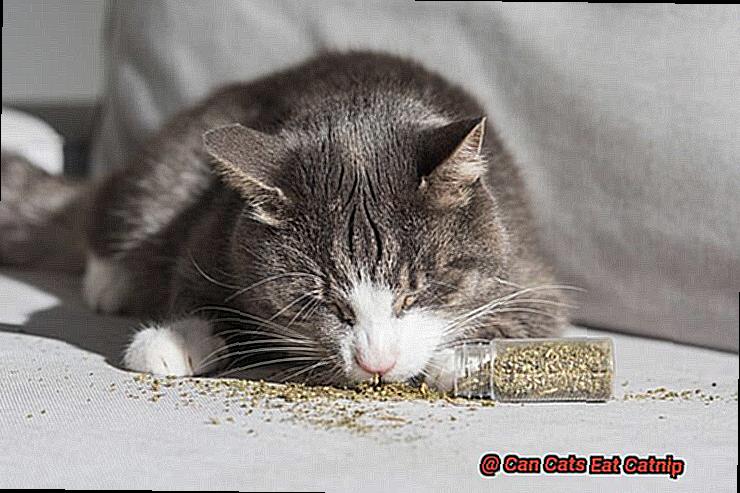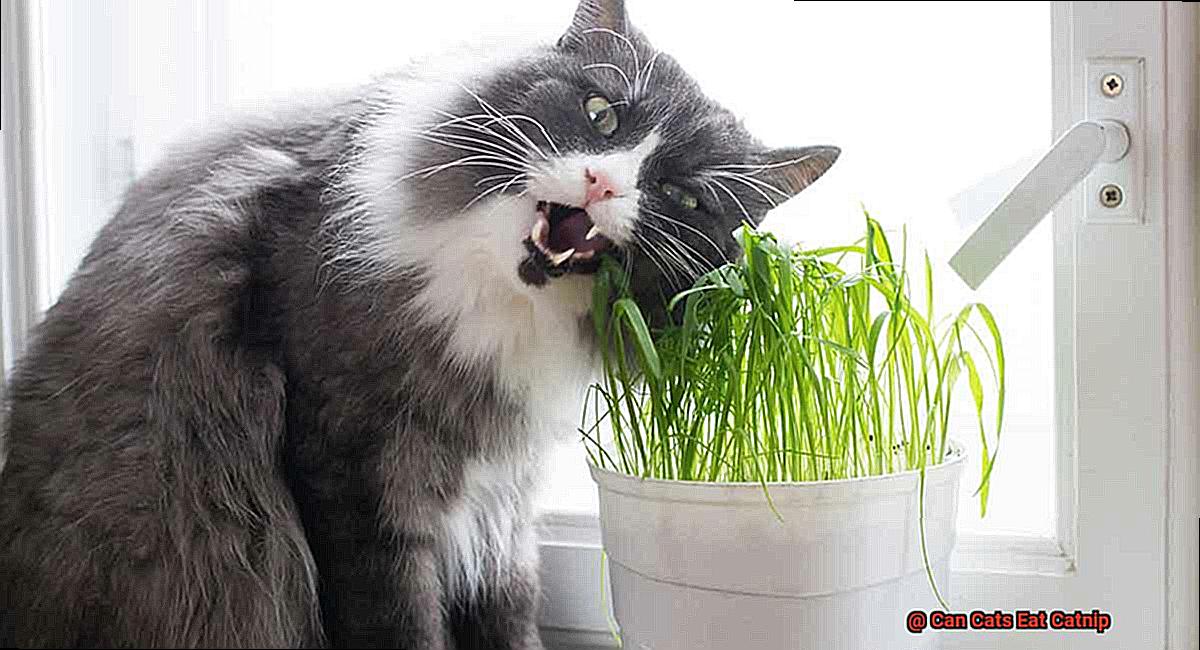Have you ever seen a cat go wild over catnip? It’s an amazing sight. Catnip is a plant that cats seem to love. But can cats actually eat it? Many pet owners have been asking this question lately.
The answer is yes, cats can eat catnip. However, there are some things you should know before letting your feline friend indulge in this herb. Let’s take a closer look at what catnip is and how it affects felines.
Catnip is a member of the mint family that contains the essential oil neltone. When cats smell it, they often become quite excited, rolling around, purring, meowing or even being territorial toward other cats or objects in the area. Some cats may even be “high” after smelling the plant.
Although eating catnip isn’t necessary for your cat’s wellbeing, it does have certain advantages such as relieving stress and anxiety and providing a boost of energy for playtime. Not all cats are affected by catnip though – up to half of felines don’t respond to it at all – but those that do experience these beneficial results.
If you want your furry pal to enjoy the benefits of this herb, feel free to give them regular or dried catnip every now and then. Just remember that too much of something can be harmful so make sure to track their intake and only give them small amounts at a time.
Is Catnip Safe for Cats to Eat?

Catnip is a magical herb that cats just can’t resist. This member of the mint family has a pleasant scent that cats find irresistible, and it contains the chemical compound nepetalactone, which has a psychoactive effect on cats. Eating catnip in moderation is completely safe for your feline friend, and it can provide a range of benefits for their health and happiness.
Not all cats respond to catnip, but if yours loves it, you’ll be delighted to know that its effects are not harmful. It can help with digestion and relieve anxiety while also acting as a mild sedative, calming your feline friend down if they’re feeling anxious or stressed out.
Additionally, catnip is safe for human consumption as well; although it won’t have the same psychoactive effect on humans as it does on cats, it has been used for its mild sedative properties.
It’s important to note that in some cases catnip can cause a cat to become overly excited or even aggressive. However, these behaviors are usually short-lived and do not represent any significant risk to the cat’s health or well-being.
How Does Catnip Affect Cats?
Catnip is a miraculous herb that brings cats to a state of pure bliss. Its scientific name is Nepeta cataria and it contains nepetalactone, a chemical compound that stimulates cats’ olfactory receptors and causes feelings of euphoria. Although not all cats respond to catnip, those that do may exhibit interesting behaviors such as rolling around, rubbing their faces on the herb, and even aggressive habits such as biting and scratching.

So what does catnip do to cats? When cats inhale or consume catnip, it produces a pleasurable reaction in many felines. The chemical nepetalactone binds to the cat’s olfactory receptors, resulting in a calming effect. Ingesting the herb can also have a soothing effect on the digestive system and aid with constipation or mild diarrhea.
It’s important to note that cats are not addicted or harmed by catnip in any way – the effects are temporary, usually lasting 10-15 minutes – after which they may become uninterested for 30 minutes to two hours before returning to play with it again.
Don’t worry if your feline friend doesn’t respond to catnip. Silvervine is another plant that contains actinidine, which has similar reactions as nepetalactone. So there are plenty of choices out there for your kitty.

What Are the Benefits of Eating Catnip for Cats?
Catnip is like a special treat for cats – it’s a natural herb that can bring out their wild side and make them purr with joy. But did you know that catnip also has some amazing health benefits? Eating catnip can help keep your kitty healthy and happy by providing stress relief, increasing exercise, aiding digestion, and supplying essential vitamins and minerals.
When cats eat catnip, its active ingredient, nelone, stimulates their sensory receptors and induces feelings of euphoria. This can help reduce stress and anxiety as well as increasing their activity level. It can also aid digestion, aiding cats with digestive problems, while providing them with important vitamins and minerals for overall wellbeing.
However, not all cats will respond to catnip – some may even be allergic to it. So it’s best to consult a veterinarian first before introducing it into your cat’s diet. Moderation is also key – too much catnip can cause mild digestive upset such as vomiting and diarrhea.
How Much Catnip Should I Feed My Cat?
Catnip is a delightful treat for cats, sparking their inner playful tiger and making them purrfectly happy. But like all good things, moderation is key. So how much catnip should you feed your furry friend?
The answer is simple: no more than a teaspoonful every two to three weeks. Anything more than that can cause your cat to lose interest in the herb, and it may no longer have the desired effect. Additionally, every cat is unique and their reaction to catnip may vary.
It’s also important to remember that catnip isn’t a substitute for food or water. Feeding your cat large amounts of catnip can lead to loss of appetite and dehydration, so if you’re unsure about how much catnip to give your kitty, please consult with your veterinarian for personalized advice based on your cat’s health and needs.
Can Humans Eat Catnip Too?
The answer is yes. Catnip, a common herb from the mint family, is safe for humans to consume. Although cats experience a sense of euphoria when they smell or eat catnip, humans do not. Instead, it’s used as an herbal remedy for its soothing effects.
Catnip tea is most often used as a sleep aid and to reduce anxiety. It can also help with stomach discomfort and headaches. However, just like too much salt can ruin a dish, excessive catnip consumption may lead to mild side effects such as dizziness. So it’s important to use it in moderation – think of it as the perfect garnish for your meal.
It should be noted that catnip should not be used as an alternative to medical care or pharmaceuticals. Before taking any herbal products, including catnip, you should always consult with your doctor first.
What Are the Effects of Eating Catnip on Humans?
Catnip has been a beloved treat of cats for centuries, but it can also be beneficial for humans. Containing the active ingredient nepetalactone, catnip can provide mild sedative effects similar to those found in chamomile tea. While these effects can be helpful to some people, they may cause dizziness, headaches, and nausea in others.
Additionally, catnip may interact with certain medications and cause adverse side effects, so individuals taking prescription medications should consult with their doctor before consuming catnip.
Catnip has been used in traditional medicine for centuries to treat a variety of ailments such as insomnia, anxiety, and digestive discomfort. However, more research is needed to fully understand the potential benefits and risks of consuming catnip.
What Are the Risks of Feeding Your Cat Too Much Catnip?
Catnip has been a beloved treat of cats for centuries, and it’s easy to understand why. After all, who doesn’t love watching their furry friend walk around in ecstatic bliss? Although catnip is generally safe, there are certain risks associated with overindulging.
Similar to humans having too many beers at a party, cats can become overly stimulated or aggressive after consuming too much catnip. Catnip contains an organic compound called nepetalactone, which acts as a stimulant on the cat’s nervous system. If your feline friend has ingested too much, they may start running around wildly or even become aggressive towards other animals or people.
In addition to overstimulation, cats that have consumed excessive amounts of catnip may experience vomiting and diarrhea due to the essential oils contained in it which can irritate their digestive system when taken in large quantities. They may also have stomach cramps, which can be quite uncomfortable for them.
It’s also worth noting that not all cats respond to catnip in the same way; some cats may become hyperactive while others may become more relaxed and sleepy. If you’re unsure how your cat will react to catnip, it’s best to start with a small amount and observe their behavior carefully.
Catnip can be a fun way for your furry friend to have some fun, but moderation is key.
Alternatives to Giving Your Cat Catnip
There are plenty of options out there that can provide your furry friend with hours of entertainment and stimulation.
Silvervine is a popular option. This plant native to East Asia contains actinidine, a compound that stimulates cats’ senses and often has a more potent effect than catnip. Plus, some cats may even prefer it.
Valerian root is another alternative. It contains chemicals that can stimulate cats’ senses; however, it has a much stronger odor than catnip and silvervine. If this isn’t appealing to you, there are other plants such as mint or honeysuckle that can please cats without causing any harm.
Interactive toys like feather wands and laser pointers are also great options for providing your kitty with hours of fun. Playing with your cat regularly will help them stay fit and healthy while still giving them the mental stimulation they need.
Conclusion
Catnip is a magical herb that cats can’t resist. This member of the mint family has a pleasant odor that cats adore, and it contains the chemical compound neolactone, which has a psychoactive effect on cats.
Eating catnip in moderation is absolutely safe for your feline friend – providing stress relief, increased energy levels, improved digestion, essential vitamins and minerals – and plenty of fun.
Not all cats respond to catnip, but those that do may experience these great benefits. When feeding your cat, remember to use moderation – no more than a teaspoonful every two to three weeks – as too much can cause them to lose interest in the herb or mild digestive upset such as vomiting or diarrhea.
Humans can also benefit from this amazing herb for its soothing properties; it can be used as an herbal remedy for sleep aid, anxiety reduction, stomach pain relief, headaches and more. However, don’t substitute it for medical or pharmaceutical use – always consult with your doctor first before using any herbal products.
If your kitty isn’t fond of catnip there are plenty of alternatives out there; interactive toys such as feather wands and laser pointers; or other plants such as mint or honeysuckle that can please cats without causing injury.







